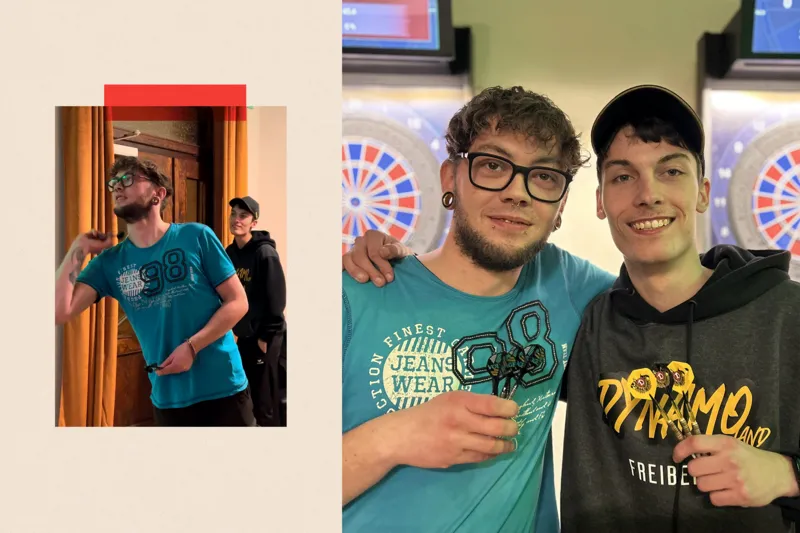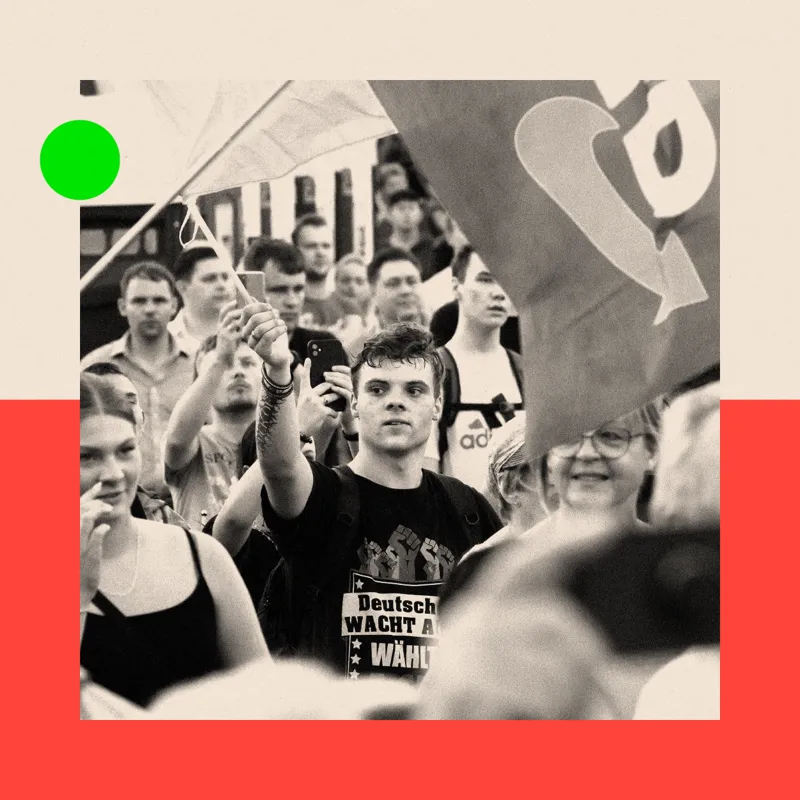- Get link
- X
- Other Apps
- Get link
- X
- Other Apps
Jessica Parker
Berlin Correspondent•MarkerJParker
Kristina Volk
"What my parents taught me is that they used to live in peace and calm, without having to have any fear in their own country," says 19-year-old Nick. "I would like to live in a country where I don't have to be afraid."
I meet him in a small bar on a street corner in the ex-mining town of Freiberg, Saxony – where he is playing darts.
It's a cold, foggy night in February with just over two weeks to go until Germany's national election.
Nick and his friend Dominic, who is 30, are backers or sympathetic to Alternative für Deutschland - a party that has been consistently polling second in Germany for more than a year and a half, as the far right here and elsewhere in Europe attracts an increasing number of young people, particularly men, into its orbit.
One particular reason why Nick – and many other young German men – say they are afraid is the number of attacks in Germany involving suspects who were asylum seekers – most recently, the fatal stabbing of a toddler and a man in a park in the Bavarian city of Aschaffenburg. Immigration is now Nick and Dominic's main concern, although they don't oppose it in all forms.
"The people who integrate, who learn, who study here, do their work - I have no problems with them," says Dominic, though he is critical of anyone he sees as taking advantage of the asylum system.
"But these days such statements are seen as hostile," says Dominic. "You're called a Nazi because of Germany's past."
Young men swinging to the right
Pew research in 2024 found that 26% of German men had positive views of the AfD compared to 11% of women, and the share of men holding this opinion has risen 10 points since 2022.
In the elections for the European Parliament in 2024, according to German exit polls the number of under 24-year-olds, both male and female, who voted for the AfD in Germany rose to 16 per cent, up by 11 points from 2019.
This comes at a time of rising general anxiety among young people according to a recent study by the German Institute for Generational Research.
In a sample size of 1,000 Germans aged 16 to 25, anxiety levels were the highest amongst respondents who class themselves as far-right while they were the lowest amongst people who put themselves in the middle of the political spectrum.
Women were more likely to be concerned for their rights and those of minority groups while men were found to be more worried about conservative values that are less based around rights.
Message spreaders
As well as gender, migration and economic issues, social media is playing a part. Platforms like TikTok allow political groups to bypass mainstream, traditional media, which the far right regard as hostile.
It's clear that AfD "dominates" TikTok when compared to other German parties, says Mauritius Dorn from the Institute for Strategic Dialogue (ISD). It has 539,000 followers on its parliamentary account, compared to 158,000 for the SPD who currently have the most seats in the German parliament.
And it isn't just official accounts but a "considerable number of unofficial fan accounts also help to disseminate the party's content", says Mr Dorn.
Through setting up 10 "persona-based" accounts with different user profiles, they found, "those users who are more on the right-wing spectrum… see a lot of AfD content whereas users from the leftist spectrum see a more diverse set of political content."
Anti 'role reversal'
Ms Brychcy is also against "role reversal" when it comes to the way men and women dress.
A reaction against "gender ideology" is another issue identified by Tarik Abou-Chadi, a professor of European Politics at the University of Oxford, as feeding far-right support amongst the young - something that is echoed by the Institute for Generational Research.
They asked first-time voters whether they found the LGBTQ+ trend "übertrieben", which literally means "exaggerated" or over the top. The respondents who showed the highest level of agreement with that question were those who planned to support the AfD.
- Get link
- X
- Other Apps



Comments
Post a Comment